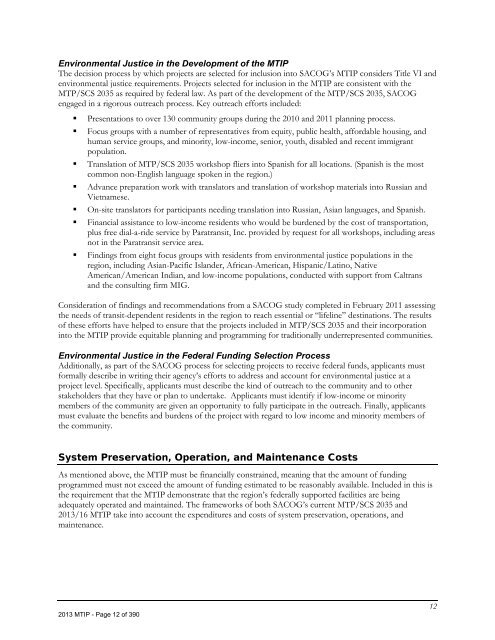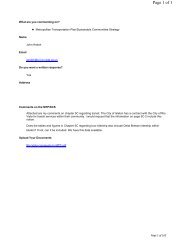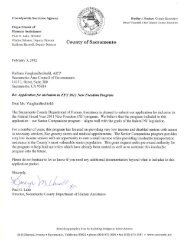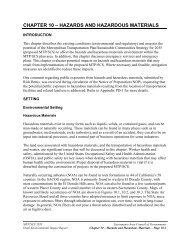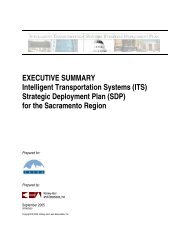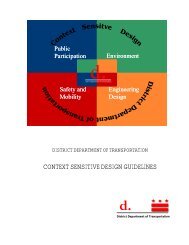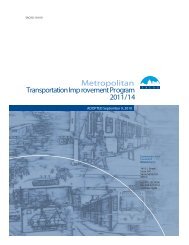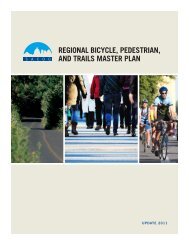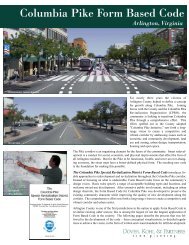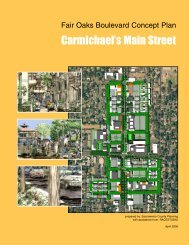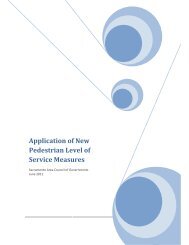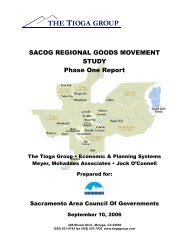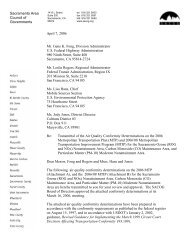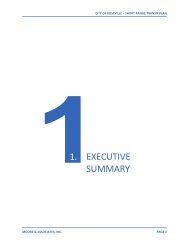- Page 1 and 2: 2013/2016 MTIP METROPOLITAN TRANSPO
- Page 3 and 4: 2013/16 MTIP Contents A Guide to th
- Page 5 and 6: Investment Decisions: MTP/SCS 2035
- Page 7 and 8: MTIP Development Schedule June 12,
- Page 9 and 10: State, Regional, and Local Programs
- Page 11 and 12: SACOG’s Project Selection Criteri
- Page 13: Annual Listing of Obligated Project
- Page 17 and 18: Endnotes and Electronic References
- Page 19 and 20: Resolution No. 64 - 2012 -2- August
- Page 21 and 22: Appendix 2 - Financial Summary TABL
- Page 23 and 24: TABLE 2: PROGRAMMED SACOG 2013-16 M
- Page 25 and 26: TABLE 3: REVENUE-PROGRAMMED SACOG 2
- Page 27 and 28: Sacramento Area Council of Governme
- Page 29 and 30: SACOG ID Project TItle VAR79001 Gro
- Page 31 and 32: SACOG ID Project TItle VAR79051 Gro
- Page 33 and 34: Sacramento Area Council of Governme
- Page 35 and 36: Sacramento Area Council of Governme
- Page 37 and 38: SACOG ID Project TItle EA Number: V
- Page 39 and 40: SACOG ID Project TItle VAR79054 Las
- Page 41 and 42: Sacramento Area Council of Governme
- Page 43 and 44: SACOG ID Project TItle VAR79066 Gro
- Page 45 and 46: SACOG ID Project TItle VAR79005 Gro
- Page 47 and 48: Sacramento Area Council of Governme
- Page 49 and 50: Sacramento Area Council of Governme
- Page 51 and 52: SACOG ID ELD19347 ELD Lead Agency C
- Page 53 and 54: Sacramento Area Council of Governme
- Page 55 and 56: Sacramento Area Council of Governme
- Page 57 and 58: Sacramento Area Council of Governme
- Page 59 and 60: SACOG ID PLA18710 PLA Lead Agency C
- Page 61 and 62: SACOG ID PLA25355 PLA Lead Agency C
- Page 63 and 64: SACOG ID PLA25345 PLA Lead Agency C
- Page 65 and 66:
SACOG ID PLA25270 PLA Lead Agency C
- Page 67 and 68:
SACOG ID PLA15660 PLA Lead Agency C
- Page 69 and 70:
SACOG ID PLA15720 PLA Lead Agency C
- Page 71 and 72:
SACOG ID PLA25377 PLA Lead Agency C
- Page 73 and 74:
SACOG ID PLA25526 PLA Lead Agency C
- Page 75 and 76:
SACOG ID PLA25501 PLA Lead Agency C
- Page 77 and 78:
SACOG ID PLA25299 PLA Lead Agency P
- Page 79 and 80:
SACOG ID PCT10494 PLA Lead Agency P
- Page 81 and 82:
SACOG ID CAL18410 SAC Lead Agency C
- Page 83 and 84:
SACOG ID CAL16790 SAC Lead Agency C
- Page 85 and 86:
SACOG ID SAC24072 SAC Lead Agency C
- Page 87 and 88:
SACOG ID SAC24094 SAC Lead Agency C
- Page 89 and 90:
SACOG ID SAC20580 SAC Lead Agency C
- Page 91 and 92:
SACOG ID SAC22990 SAC Lead Agency C
- Page 93 and 94:
SACOG ID SAC24470 SAC Lead Agency C
- Page 95 and 96:
Sacramento Area Council of Governme
- Page 97 and 98:
Sacramento Area Council of Governme
- Page 99 and 100:
Sacramento Area Council of Governme
- Page 101 and 102:
Sacramento Area Council of Governme
- Page 103 and 104:
Sacramento Area Council of Governme
- Page 105 and 106:
Last Revised Completion Year Sacram
- Page 107 and 108:
SACOG ID REG16470 SAC Lead Agency S
- Page 109 and 110:
SACOG ID YST10420 SUT Lead Agency C
- Page 111 and 112:
SACOG ID SUT10250 SUT Lead Agency C
- Page 113 and 114:
SACOG ID CAL18824 YUB Lead Agency C
- Page 115 and 116:
SACOG ID YOL19210 Yol Lead Agency C
- Page 117 and 118:
Last Revised Completion Year Sacram
- Page 119 and 120:
Sacramento Area Council of Governme
- Page 121 and 122:
SACOG ID UNI10469 Yol Lead Agency U
- Page 123 and 124:
Sacramento Area Council of Governme
- Page 125 and 126:
SACOG ID SAC21710 SAC Lead Agency S
- Page 127 and 128:
SACOG ID SUT10450 SUT Lead Agency S
- Page 129 and 130:
SACOG ID VAR56098 VAR Lead Agency S
- Page 131 and 132:
SACOG ID VAR56101 VAR Lead Agency S
- Page 133 and 134:
Sacramento Area Council of Governme
- Page 135 and 136:
SACOG ID YOL17010 Yol Lead Agency S
- Page 137 and 138:
Sacramento Area Council of Governme
- Page 139 and 140:
SACOG ID PLA19910 PLA Lead Agency C
- Page 141 and 142:
SACOG ID PLA25472 PLA Lead Agency P
- Page 143 and 144:
SACOG ID SAC24130 SAC Lead Agency C
- Page 145 and 146:
SACOG ID SAC24483 SAC Lead Agency C
- Page 147 and 148:
SACOG ID SAC24643 SAC Lead Agency C
- Page 149 and 150:
Sacramento Area Council of Governme
- Page 151 and 152:
Sacramento Area Council of Governme
- Page 153 and 154:
Sacramento Area Council of Governme
- Page 155 and 156:
SACOG ID SUT18862 SUT Lead Agency S
- Page 157 and 158:
SACOG ID YOL19300 Yol Lead Agency C
- Page 159 and 160:
SACOG ID CAL20400 ELD Lead Agency C
- Page 161 and 162:
SACOG ID CAL20451 SAC Lead Agency C
- Page 163 and 164:
SACOG ID CAL20470 SAC Lead Agency C
- Page 165 and 166:
SACOG ID ELD19256 ELD Lead Agency C
- Page 167 and 168:
Sacramento Area Council of Governme
- Page 169 and 170:
Sacramento Area Council of Governme
- Page 171 and 172:
Sacramento Area Council of Governme
- Page 173 and 174:
Sacramento Area Council of Governme
- Page 175 and 176:
Sacramento Area Council of Governme
- Page 177 and 178:
Sacramento Area Council of Governme
- Page 179 and 180:
SACOG ID PLA25446 PLA Lead Agency P
- Page 181 and 182:
SACOG ID PLA25454 PLA Lead Agency P
- Page 183 and 184:
SACOG ID PLA25426 PLA Lead Agency P
- Page 185 and 186:
SACOG ID PLA25475 PLA Lead Agency P
- Page 187 and 188:
SACOG ID PLA25513 PLA Lead Agency P
- Page 189 and 190:
Sacramento Area Council of Governme
- Page 191 and 192:
Sacramento Area Council of Governme
- Page 193 and 194:
Sacramento Area Council of Governme
- Page 195 and 196:
Sacramento Area Council of Governme
- Page 197 and 198:
Sacramento Area Council of Governme
- Page 199 and 200:
SACOG ID SUT18854 SUT Lead Agency S
- Page 201 and 202:
SACOG ID YUB16018 YUB Lead Agency Y
- Page 203 and 204:
SACOG ID YUB16023 YUB Lead Agency Y
- Page 205 and 206:
SACOG ID YOL19289 Yol Lead Agency Y
- Page 207 and 208:
SACOG ID YOL18234 Yol Lead Agency Y
- Page 209 and 210:
SACOG ID REG17796 SAC Lead Agency S
- Page 211 and 212:
SACOG ID REG17952 SAC Lead Agency S
- Page 213 and 214:
SACOG ID SAC24477 SAC Lead Agency C
- Page 215 and 216:
Sacramento Area Council of Governme
- Page 217 and 218:
SACOG ID ELD14090 ELD Lead Agency C
- Page 219 and 220:
SACOG ID PLA25520 PLA Lead Agency C
- Page 221 and 222:
SACOG ID YUB16027 YUB Lead Agency Y
- Page 223 and 224:
Sacramento Area Council of Governme
- Page 225 and 226:
SACOG ID PLA25462 PLA Lead Agency C
- Page 227 and 228:
SACOG ID PLA25417 PLA Lead Agency C
- Page 229 and 230:
SACOG ID PLA25416 PLA Lead Agency C
- Page 231 and 232:
SACOG ID PLA25511 PLA Lead Agency W
- Page 233 and 234:
SACOG ID SAC24598 SAC Lead Agency C
- Page 235 and 236:
SACOG ID PAR10023 SAC Lead Agency P
- Page 237 and 238:
SACOG ID VAR56079 SAC Lead Agency S
- Page 239 and 240:
SACOG ID REG17956 SAC Lead Agency S
- Page 241 and 242:
SACOG ID VAR56092 VAR Lead Agency S
- Page 243 and 244:
SACOG ID VAR56097 VAR Lead Agency S
- Page 245 and 246:
Sacramento Area Council of Governme
- Page 247 and 248:
SACOG ID YST10441 YUB Lead Agency Y
- Page 249 and 250:
SACOG ID YCT18241 Yol Lead Agency Y
- Page 251 and 252:
SACOG ID YCT18240 Yol Lead Agency Y
- Page 253 and 254:
SACOG ID CAL20479 SAC Lead Agency C
- Page 255 and 256:
SACOG ID SAC24411 SAC Lead Agency C
- Page 257 and 258:
Sacramento Area Council of Governme
- Page 259 and 260:
SACOG ID SUT18858 SUT Lead Agency C
- Page 261 and 262:
SACOG ID YUB16011 YUB Lead Agency Y
- Page 263 and 264:
SACOG ID YOL19283 Yol Lead Agency C
- Page 265 and 266:
SACOG ID CAL20449 SAC Lead Agency C
- Page 267 and 268:
SACOG ID CAL20473 YUB Lead Agency C
- Page 269 and 270:
SACOG ID SAC24410 SAC Lead Agency C
- Page 271 and 272:
SACOG ID PCT10501 PLA Lead Agency P
- Page 273 and 274:
SACOG ID PAR10019 SAC Lead Agency P
- Page 275 and 276:
SACOG ID REG18010 SAC Lead Agency S
- Page 277 and 278:
SACOG ID UNI10468 Yol Lead Agency U
- Page 279 and 280:
SACOG ID VAR56029 VAR Lead Agency S
- Page 281 and 282:
SACOG ID PAR10021 SAC Lead Agency P
- Page 283 and 284:
SACOG ID PLA25353 PLA Lead Agency C
- Page 285 and 286:
Sacramento Area Council of Governme
- Page 287 and 288:
SACOG ID REG18009 SAC Lead Agency S
- Page 289 and 290:
SACOG ID YCT18246 Yol Lead Agency Y
- Page 291 and 292:
SACOG ID CAL20439 PLA Lead Agency C
- Page 293 and 294:
Sacramento Area Council of Governme
- Page 295 and 296:
SACOG ID PLA25433 PLA Lead Agency P
- Page 297 and 298:
SACOG ID SAC24611 SAC Lead Agency C
- Page 299 and 300:
SACOG ID YUB16009 YUB Lead Agency Y
- Page 301 and 302:
SACOG ID CAL20453 ELD Lead Agency C
- Page 303 and 304:
SACOG ID CAL20478 SAC Lead Agency C
- Page 305 and 306:
SACOG ID CAL20475 YUB Lead Agency C
- Page 307 and 308:
SACOG ID PLA25226 PLA Lead Agency C
- Page 309 and 310:
SACOG ID SAC24631 SAC Lead Agency C
- Page 311 and 312:
SACOG ID YUB16025 YUB Lead Agency C
- Page 313 and 314:
Sacramento Area Council of Governme
- Page 315 and 316:
SACOG ID CAL20447 ELD Lead Agency C
- Page 317 and 318:
SACOG ID SAC24653 SAC Lead Agency C
- Page 319 and 320:
SACOG ID SAC24644 SAC Lead Agency C
- Page 321 and 322:
Sacramento Area Council of Governme
- Page 323 and 324:
SACOG ID REG17929 SAC Lead Agency S
- Page 325 and 326:
Sacramento Area Council of Governme
- Page 327 and 328:
SACOG ID UCD10000 Yol Lead Agency U
- Page 329 and 330:
SACOG ID YOL19213 Yol Lead Agency C
- Page 331 and 332:
Completed Projects from the 2011/14
- Page 333 and 334:
Completed Projects from the 2011/14
- Page 335 and 336:
Completed Projects from the 2011/14
- Page 337 and 338:
Completed Projects from the 2011/14
- Page 339 and 340:
Completed Projects from the 2011/14
- Page 341 and 342:
Completed Projects from the 2011/14
- Page 343 and 344:
Completed Projects from the 2011/14
- Page 345 and 346:
Completed Projects from the 2011/14
- Page 347 and 348:
Completed Projects from the 2011/14
- Page 349 and 350:
Completed Projects from the 2011/14
- Page 351 and 352:
Completed Projects from the 2011/14
- Page 353 and 354:
Appendix 5 ‐ Completed, Delayed,
- Page 355 and 356:
Appendix 5 ‐ Completed, Delayed,
- Page 357 and 358:
Amendment #1 to the Metropolitan Tr
- Page 359 and 360:
decisions, a Atrip reduction/travel
- Page 361 and 362:
attainment area for the purposes of
- Page 363 and 364:
transportation improvement programs
- Page 365 and 366:
Comments from the Public Response t
- Page 367 and 368:
RESPONSE TO MTIP LETTER 1 - Kendra
- Page 369 and 370:
RESPONSE TO MTIP LETTER 2 - Dennis
- Page 371 and 372:
2013 MTIP - Page 369 of 390
- Page 373 and 374:
2013 MTIP - Page 371 of 390
- Page 375 and 376:
RESPONSE TO MTIP LETTER 3 - Vincent
- Page 377 and 378:
APPENDIX 1: EXPEDITED PROJECT SELEC
- Page 379 and 380:
2013 MTIP - Page 377 of 390 Appendi
- Page 381 and 382:
2013 MTIP - Page 379 of 390 Appendi
- Page 383 and 384:
2013 MTIP - Page 381 of 390
- Page 385 and 386:
2013 MTIP - Page 383 of 390
- Page 387 and 388:
2013 MTIP - Page 385 of 390
- Page 389 and 390:
2013 MTIP - Page 387 of 390
- Page 391 and 392:
2013 MTIP - Page 389 of 390
- Page 393 and 394:
WHAT WE DO The Sacramento Area Coun


